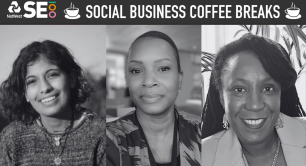Start small, but start somewhere meaningful: How to be brilliant at reporting your impact
Don’t be scared to report on things that aren’t perfect, make reporting central to your work and ask difficult questions. Expert advice for social enterprises and other impact-focused organisations from our webinar on impact reporting.
You can use Joe Wicks’ fitness classes to pump up your muscles, but you shouldn’t use him (or any other available celebrities) to pump up your audience numbers for a webinar – at least according to Ben White.
Ben (pictured) invoked the British fitness influencer to illustrate the point that it might be possible to use superficial means to boost your metrics (in this case, using a celebrity to increase the audience of a webinar) but it doesn’t meaningfully contribute to the impact of your work.

Or, as Ben said: “Outputs are the stuff that’s easy to measure, easy to count, easy to pump up, but the outcomes are the more meaningful one, that's the change you’re trying to create in the world.”
This was just one lesson of many shared during the most recent SE100 Social Business Coffee Breaks webinar on how to be brilliant at reporting your impact.
Outputs are the stuff that’s easy to measure, easy to count, easy to pump up, but the outcomes are the more meaningful one, that's the change you’re trying to create in the world
The Social Business coffee breaks webinars, organised in partnership with NatWest Social and Community Capital, aim to provide inspiration and practical advice to help social businesses to grow and thrive. This edition, held on 18 September, was also supported by Impact Reporting, a specialist impact software platform and consultancy, where Ben White is managing director.
Introducing the webinar, host Tim West, Pioneers Post founding editor and CEO, said being able to tell a compelling story about your impact was a major factor in how successful you would be in winning business, in being awarded contracts or securing investment.
As well as Ben, the webinar featured input from Verena Hefti, founder and CEO of Leaders Plus, Teàrlach Wilson, founding director of An Taigh Cèilidh CIC, Aishwarya Bajpai, On Purpose Associate at NatWest Social & Community Capital and Brendan Hegarty, Social & Community Capital loans officer.
Their contributions included Ben debunking myths about impact reporting, Verena’s journey from being “uncomfortable with impact reporting” to becoming the SE100 Impact Management Champion 2024 and how postcards are helping An Taigh Cèilidh promote Gaelic language and culture.
Inspiration, support and advice for better impact management and reporting
These resources were shared by speakers and audience members during the webinar. |
Debunking impact management myths
Ben White debunked three key myths about impact reporting: that impact reporting is just for large organisations which produce glossy reports; that you can’t report impact if you can’t put a number or value on something; and that bigger is always better.
For social entrepreneurs or enterprises feeling apprehensive about impact reporting, Ben advised: “Don’t let the kind of potential complexity and difficulty of impact reporting put you off. Start small and start somewhere meaningful.”
To do so, Ben stressed the importance of looking at the outcome you want to have and what data you need to inform decision-making to improve that impact, rather than just focussing on reporting impressive sounding numbers. He said doing so would make impact reporting far more interesting and integral to your organisation.
|
Ben White’s top impact reporting tips
|
How Leaders Plus added impact reporting into its work

Verena Hefti (pictured) is founder and CEO of Leaders Plus, a social enterprise working with parents during maternity leave, shared parental leave, and beyond to progress in their careers.
The SE100 Impact Management Champion 2024 award was given to Leaders Plus because the organisation’s impact reporting showed genuine commitment to understanding impact from a stakeholder perspective, then building this understanding into its operations.
When Verena founded Leaders Plus she was uncomfortable with the idea of impact reporting, but a mentor supported her to conduct a baseline survey and write a theory of change. She credits this with enabling Leaders Plus to better tailor the content of its programme towards delivering the impact it wanted to achieve. She said: “I think the biggest thing I learned, and the most powerful, was to think about the questions that we ask and the decisions we want to make as a result of the data.”

Verena explained that to ensure Leaders Plus was able to gather the data it needed for its impact reporting, the organisation all participants were expected to complete impact surveys. Time is allocated in Leaders Plus course agendas to allow participants to complete the surveys and a QR code is provided on PowerPoint slides so people can access the survey immediately.
Verena said initially they tried to improve the surveys by changing the questions each year, but an important lesson was that to have comparable data the questions needed to remain the same. Leaders Plus asks alumni and employers of alumni to help interpret the raw data from its surveys and Verena said a key part of the process was sharing results with contributors to ensure transparency.
See Verena's slides from the webinar here
|
Verena’s top impact reporting tips
|
A Scottish cèilidh house gets the seal of approval

Teàrlach Wilson is founding director of An Taigh Cèilidh, a community interest company which runs a Gaelic cultural centre and community café in Stornoway, Scotland. An Taigh Cèilidh is partly funded by NatWest Social and Community Capital, which has been impressed with the organisation’s methods of collecting and interpreting data to increase its impact.
Because social entrepreneurs are committed to making impact, Teàrlach said he thought most were already good at telling people what they did from talking about their work to family and friends. He said impact reporting was just putting this enthusiasm and information into a format other people could understand, so it shouldn’t be seen as arduous or intimidating.
To gather feedback, An Taigh Cèilidh invites people to answer questions on postcards left around the community café. These have resulted in a range of responses, from comprehensive essays on what’s good or not about the company to a child drawing a seal and writing “you have the seal of approval”.
An Taigh Cèilidh also carried out a larger survey about how people felt about the Gaelic language and An Taigh Cèilidh. People were incentivised to take part in this through a prize draw and Teàrlach agreed with Verena that sometimes it took effort to convince people to contribute feedback so you shouldn’t be afraid to be a bit pushy.
Teàrlach said finding relevant strategies and research were an important part of framing An Taigh Cèilidh’s impact, in order to identify wider objectives which the organisation contributed to. In An Taigh Cèilidh’s case, they looked at the Scottish government’s National islands plan and Gaelic language plan.
Teàrlach’s top impact reporting tips
|
Don’t apologise for what you do, showcase it

Aishwarya Bajpai (pictured) from NatWest Social and Community Capital encouraged social entrepreneurs to approach impact reporting with curiosity and to ask difficult questions. When starting out in impact reporting, Aishwarya said challenging assumptions would enable organisations to move their missions forwards.
Finding impact reports from organisations and asking people who worked on them for help are a great way to improve your own work, said Aishwarya, adding: “People will support and be open to changes, because we are privileged to be in the sector where everyone wants to make a difference, and so no one is going to shut you down because they know your intentions.”
Brendan Hegarty said funders like NatWest Social & Community Capital wanted to understand why social enterprises do what they do and want to hear beneficiaries’ stories. He said: “We look for you to tell us about your impact, your measurement, why you do it, the beneficiary story. Don’t apologise for doing what you do, showcase it.”
Social enterprises shouldn’t be scared to report on elements of their work which aren’t perfect yet, said Brendan. It can be just as powerful to acknowledge an aspect of your work which you’ve identified as needing improvement and detailing how you intend to find a solution.
Aishwarya and Brendan’s top impact reporting tips
|
Thanks for reading our stories. As an entrepreneur or investor yourself, you'll know that producing quality work doesn't come free. We rely on our subscribers to sustain our journalism – so if you think it's worth having an independent, specialist media platform that covers social enterprise stories, please consider subscribing. You'll also be buying social: Pioneers Post is a social enterprise itself, reinvesting all our profits into helping you do good business, better.




